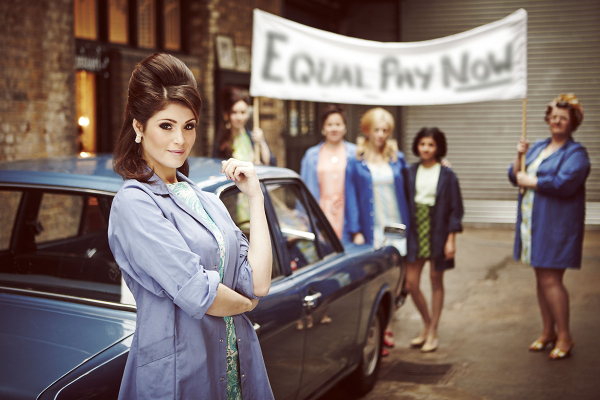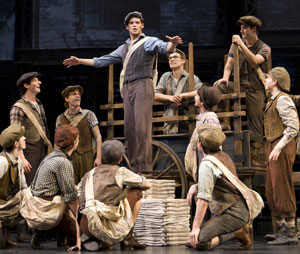Michael Coveney: Made in Dagenham strikes a chord; Tim Crouch weighs art against life; RIP David MacLennan

The press launch of Made in Dagenham brings the crunching sound of industrial dispute right into the West End; there has to be a direct correlation between the 1968 women’s strike at the Dagenham Ford plant and the student/worker alliance of protest during the Paris événements of May in the same year.
There was a time when industrial action was all the rage in fringe theatre, and no self-respecting actor’s CV was complete without a miner’s wife, a trade union leader, a soap box politician, a scab. Even Laurence Olivier gave his last stage performance as a sulphurous Glaswegian Trotskyite in Trevor Griffiths’ The Party (admittedly at the National, not on the fringe), attacking intellectuals for being out of touch with the common cause, the people’s struggle.
These days, fringe mavens are more likely to pontificate on aesthetics and theory. Tim Crouch flagged up his new play at the Royal Court, for instance, with a tortuous tip-toe around concepts of art in life in the Guardian this week: "Adler & Gibb balances the lives of my invented artists with the story of an actor who goes to unethical extremes to convince her audience that she is someone other than herself."
I’m a big Crouch fan, especially of his solo Shakespeare turns as the unknown Malvolio or Peaseblossom, but the reality and illusion axis is well and truly Pirandello'd by now and seems a poor substitute for actually saying something about our society and the way we live, on or off the picket lines.
Which is why the revival of David Hare’s Skylight with Bill Nighy and Carey Mulligan is so salutary – it’s actually about ideological differences over things that matter in business, life-style, education, and of course love. And, formally, it’s no less interesting than theatre work that proclaims its formal credentials more openly.
Crouch talks of "reality" and "real," making a fine distinction. The "reality" of industrial disputes will no doubt be honoured in Made in Dagenham, as it was in The Party. But the National had its own "real" with the energy-sapping, dispiriting industrial disputes that surrounded its own building when it was going up in the early 1970s.
More musical political theatre than we thought
Hang on a mo, though: there’s a bit of a popular political theatre fightback going on already, despite director Rupert Goold saying that he hopes Made in Dagenham will put musical theatre back on the map as a place where you can tell stories in song (by which I take it he means political stories). So it’s another Billy Elliot or Brassed Off, both of which use the miners’ strike of the mid-1980s as a key setting for musical theatre.

I’d be surprised if Edward Hall hasn’t added songs to Beth Steel’s new play Wonderland at Hampstead next week, as that harks back to the days of the miners’ strike and political stand-off, too.
One of my favourite current musicals is Newsies in New York, which jumps off (literally; the choreography is sensational) into a political fairground and fist-fight following a late 19th century strike of the newspaper boys on street corners.
All of these shows have one thing in common: they started as movies, a fact which slightly undermines the current orthodox view that the theatre, with Nicolas Kent‘s tribunal plays at the Tricycle and Max Stafford-Clark’s ongoing Out of Joint campaign, is currently re-born as a crucible of political "where-it’s-at"; though, admittedly, the cinema didn’t do Enron, This May Hurt A Bit, or Jerusalem.
Political theatre with the late David MacLennan
Political theatre, right-wing commentators are always quick to point out, is a synonym for left-wing, or socialist, theatre, somehow imagining there’s a big conspiracy to keep out the sort of writers they might agree with. The fact is that people who work in the theatre tend not to be of an "establishment" or reactionary turn of thought. Working in theatre is in itself some sort of ideological protest vote.
And no company in our recent history embodied this spirit more than 7:84 in the 1970s, co-founded by the late John McGrath, his wife, the actress Elizabeth McLennan, and Liz’s brother, David MacLennan, who died last week.
7:84 – the name was derived from a controversial economic statistic that seven per cent of the population owned 84 per cent of the nation’s wealth – was formed in England in 1971, followed a few years later by a Scottish (and usually superior) edition that ran in parallel with it for over ten years.
Less well known, on this side of the border at least, was that David ran an extraordinary lunchtime theatre project called A Play, a Pie and a Pint in the crypt of a disused Glasgow church, Oran Mor, these last ten years; the programme runs for 42 weeks a year and produces local and international playwrights and now serves as a sort of unofficial feeder wing to the National Theatre of Scotland.
The audience is numbered every single day in the hundreds, not the dozens. And on stage you’re as likely to see Robbie Coltrane, Liz Lochhead, David Greig, Elaine C Smith, Bill Paterson and Alan Cumming as you are the latest new actors and writers.
The current show is a local mash-up of The Misanthrope (Scottish Moliere is an age-old tradition), followed by Don Quixote, Hamlet and Maw Goose, the summer panto. Summer panto? McLennan jovially justified this anomaly by saying 1) panto is always boffo business and 2) there is some sort of spurious precedent lodged in the unreliable history of amateur theatre along the Ayrshire coast.










